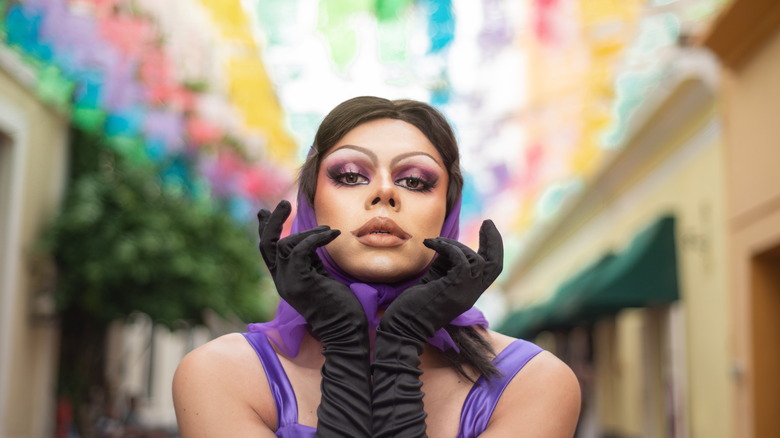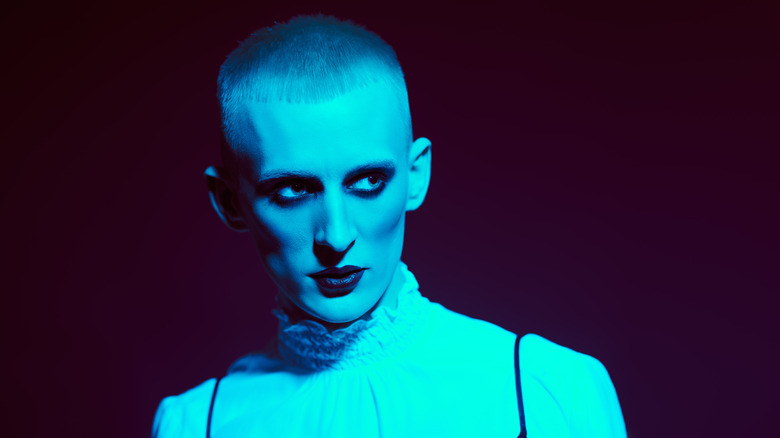What Is Gender Dysphoria And How Can You Tell If You're Experiencing It?
We're living in an age where a public personality, like singer/actor Demi Lovato, speaks openly about being non-binary and pansexual, and a movie star, like Ellen Page, fully transitions into Elliot Page. They're courageous for bringing the messiness of orientation and identity issues into the white-hot glare of fame.
We've long known that sexuality exists on a wide spectrum from gay to straight with a universe of nuance in between. So why wouldn't gender and gender expressions also exist on their own expansive spectrum? We'll dive more deeply into several definitions, but, simply put, the word dysphoria means discomfort or malaise. Gender dysphoria is a feeling of discomfort or distress about your birth gender compared to how you feel on the inside. It can start in childhood, adolescence, or adulthood.
These differences have been with us throughout the history of humanity. The diversity of sexual expression seems to threaten certain groups, and at this cultural moment, transgender people are being legally targeted and excluded. We should all be concerned about the dehumanizing anti-LGBTQ legislation that's been introduced across the country. One way to make your voice heard is at the ballot box. You can also support the LGBTQ community beyond voting.
How you can tell if you're experiencing gender dysphoria?
Although each of us is on a unique journey, gender dysphoria tends to show up in some specific and predictable ways. You may feel a marked discomfort with your bits and pieces — i.e., feeling upset that you have breasts (or a mustache and beard), or disliking the genitals you were born with and wanting to hide or get rid of them. If you have gender dysphoria, you might insist that your gender assigned at birth is in conflict with your gender identity. You may be most comfortable inhabiting your preferred gender and troubled when you feel pressured to dress or otherwise express yourself as your birth gender.
Under these circumstances, it would be totally normal to feel desperately lonely and like an outlier when you're around your friends. You may feel an inner pressure to act as though you feel accepted by the group, but inwardly feel like you're not in the same tribe (although this can happen to many of us who don't have gender dysphoria). It might feel quite difficult to execute the simple daily activities of life. Some with gender dysphoria are tagged as "different" and, unfortunately, experience bullying.
How does gender dysphoria feel?
It's important to note that gender dysphoria used to be known as Gender Identity Disorder by the psychiatric community and was previously considered a mental illness. In 2013, "disorder" was changed in the DSM V (the Diagnostic and Statistical Manual of Mental Disorders) to remove the pathologizing language and to take more of a supportive position toward the community. It's now considered a medical designation rather than a disorder.
The social stigma against minorities and those who look or act differently than the majority contributes to a great deal of unnecessary pain and discomfort. People with gender dysphoria may develop so much anxiety that they isolate themselves, cutting themselves off from the very care and support they need. They might become depressed because they feel so misunderstood. Some regularly experience discrimination from the medical community, employers, and neighbors. This can lead to feelings of shame and more drastic actions like self-harm.
There is compassionate medical and psychological support. Gender reassignment surgery, hormones, and facial feminization or masculinization surgery are available. Equally important is access to caregivers and therapists who can help clients lower stress, experience more inner calm and harmony, and develop skills to manage their feelings and how they communicate.
If you or anyone you know is having suicidal thoughts, please call the National Suicide Prevention Lifeline by dialing 988 or by calling 1-800-273-TALK (8255).
A few definitions and distinctions
As the culture evolves, more fine-tuned terminology comes forward to help us define ourselves. One definition we all share — we all have a gender identity. It's your inner sense of being male, female, neither, or a fluid, shifting combination of both. It might sync up with your birth gender, or it might not. Gender expression also applies to everyone and it simply means how we speak, choose to adorn, accessorize, and dress ourselves, and it may or may not reflect our birth gender.
Non-binary means you feel that your identity is not strictly male or female or might be both. Being gender non-conforming differs from being non-binary and from gender dysphoria. People who are gender non-conforming may feel perfectly comfortable with their assigned gender but present themselves in atypical ways, rejecting stereotypes about what feminine or masculine is supposed to look like. One prominent example is the eye makeup and feminine-style clothing and accessories Prince wore while performing.
Cisgender means you feel aligned with the gender you were born with. Transgender means someone whose gender identity is at odds with the gender assigned at birth. The bottom line is, if a label is supportive, claim it, but if it feels confining, just be yourself and let the label go.



